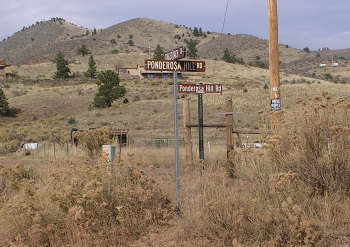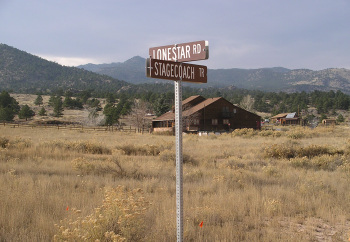Story of Human Language and Societal Comments
If I had to recommend only one of the teaching company courses to someone I like, that course would be The Story of Human Language. And the reason is not so much for the course material, but for the lecturer, John McWhorter. He could talk about most anything and I think I would enjoy it. A Google search of his name pulls up many links, including a Wikipedia entry. He studies creole languages and has written several books, including Winning the Race: Beyond the Crisis in Black America. He sprinkled the lectures with subtle humor. For instance, in a discussion of some intellectual aspect of language he tossed in a reference to the US as "a tortured, first-world, over-developed country".
A tortured, first-world, over-developed country. Says up a lot.
An example of over-development recently popped up right next to where I live. For a couple decades, we have lived a ways out in the country on dirt roads with homes widely spread. No roads were marked, but we all got around just fine. Overnight the county must have decided that that was not right. See the photo below. They went a little overboard.

If my grammar here is a little less formal than normal, it's because of the course. I now feel that sometimes it's important to just let those grammar rules go. To be less tortured. More on this and other ideas and a couple more photos are in the continuation of this blog entry.
Ideas from the language course.
I had thought that this course would be about the history of words and how they evolve. No, it wasn't about that hardly at all. McWhorter said that that sort of study was like "collecting butterflies". Instead, he opened my mind to a lot of different ideas, ideas that float in and out of my daily thoughts and enrich my life (and mess up my grammar).
Each world language is in constant flux. Words soften in predictable ways, one sound changing to another sound because it is easier to say. All languages might be a variation on a single language, all languages might be considered dialects of a language begun thousands of years ago.
Written language is an artifice, and the writing of a language works to slow its natural flux. It was only in the 1700s that someone wrote down grammar rules for English and people then felt they had to follow these rules. Following grammar rules becomes an intellectual exercise and not necessarily the natural speaking of the language.
If spoken language has been around for 24 hours, written language appeared in the last few minutes.
We speak one type of English, so-called "high" English, but write another, so-called "low" English. Since only those that go to school learn written English, those that speak "low" English are often judged as inferior.
A couple examples of word-usage of low/spoken vs high/written: "come back" is used in spoken English, "return" is used in written; bag is spoken, parcel is written. You don't say "return to me, Joe" you say "come back to me, Joe". You don't say "I left a parcel on the table" you say "I left a bag on the table".
In any one language, there is not a right and a wrong way of speaking, there are just two ways of speaking.
There is the English that you learn on your mother's knee, and then you lear formal English in school. McWhorter referred to this as "blackboard grammar".
Certain ways of speaking a particular language become a way to judge people culturally. A person who speaks a different dialect might be judged to be inferior.
People can communicate quite well without proper blackboard grammar. Recordings of casual speakers reveal that we do not speak in complete sentences most of the time, but we are quite able to get our ideas across.
(I myself have often become caught up in grammar rules. Like searching for "which" and changing it to "that" according to some rules that I read; being fanatic about not ending a sentence with a preposition. Now I view this aspect of myself more like a light obsession: I like nice neat rules, it's a way to try to make things perfect.)
Humans have a biological capacity for language, often called the Language Instinct (this theory is disputed). Many experts believe that our brains are hard-wired to learn language, and that there is a window during human development in which language is easily learned. Humans have to hear and speak language at an early age (as children) to sound like a native speaker; they can learn several languages at once during this period of development. They catch on to a basic grammar easily.
Dogs can learn words, but can't put together a thought such as "tomorrow I am going to try to open the gate".
The last couple minutes of the course sums up the gist of the course:
"World languages are a wonderful thing. They are dynamic systems and symbionic systems, in a constant state of flux. Sometimes that flux is predictable in fascinating ways, sometimes the flux is surprising in enchanting ways. Language is not just a basket of words and it is not a basket of words knit together by a collection of rules that we learn in school and usually fall short of. A language is one of the many wonders of being human."
Our house and the new road signs.

The moon at sunrise, November 26.

A tortured, first-world, over-developed country. Says up a lot.
An example of over-development recently popped up right next to where I live. For a couple decades, we have lived a ways out in the country on dirt roads with homes widely spread. No roads were marked, but we all got around just fine. Overnight the county must have decided that that was not right. See the photo below. They went a little overboard.

If my grammar here is a little less formal than normal, it's because of the course. I now feel that sometimes it's important to just let those grammar rules go. To be less tortured. More on this and other ideas and a couple more photos are in the continuation of this blog entry.
Ideas from the language course.
I had thought that this course would be about the history of words and how they evolve. No, it wasn't about that hardly at all. McWhorter said that that sort of study was like "collecting butterflies". Instead, he opened my mind to a lot of different ideas, ideas that float in and out of my daily thoughts and enrich my life (and mess up my grammar).
Each world language is in constant flux. Words soften in predictable ways, one sound changing to another sound because it is easier to say. All languages might be a variation on a single language, all languages might be considered dialects of a language begun thousands of years ago.
Written language is an artifice, and the writing of a language works to slow its natural flux. It was only in the 1700s that someone wrote down grammar rules for English and people then felt they had to follow these rules. Following grammar rules becomes an intellectual exercise and not necessarily the natural speaking of the language.
If spoken language has been around for 24 hours, written language appeared in the last few minutes.
We speak one type of English, so-called "high" English, but write another, so-called "low" English. Since only those that go to school learn written English, those that speak "low" English are often judged as inferior.
A couple examples of word-usage of low/spoken vs high/written: "come back" is used in spoken English, "return" is used in written; bag is spoken, parcel is written. You don't say "return to me, Joe" you say "come back to me, Joe". You don't say "I left a parcel on the table" you say "I left a bag on the table".
In any one language, there is not a right and a wrong way of speaking, there are just two ways of speaking.
There is the English that you learn on your mother's knee, and then you lear formal English in school. McWhorter referred to this as "blackboard grammar".
Certain ways of speaking a particular language become a way to judge people culturally. A person who speaks a different dialect might be judged to be inferior.
People can communicate quite well without proper blackboard grammar. Recordings of casual speakers reveal that we do not speak in complete sentences most of the time, but we are quite able to get our ideas across.
(I myself have often become caught up in grammar rules. Like searching for "which" and changing it to "that" according to some rules that I read; being fanatic about not ending a sentence with a preposition. Now I view this aspect of myself more like a light obsession: I like nice neat rules, it's a way to try to make things perfect.)
Humans have a biological capacity for language, often called the Language Instinct (this theory is disputed). Many experts believe that our brains are hard-wired to learn language, and that there is a window during human development in which language is easily learned. Humans have to hear and speak language at an early age (as children) to sound like a native speaker; they can learn several languages at once during this period of development. They catch on to a basic grammar easily.
Dogs can learn words, but can't put together a thought such as "tomorrow I am going to try to open the gate".
The last couple minutes of the course sums up the gist of the course:
"World languages are a wonderful thing. They are dynamic systems and symbionic systems, in a constant state of flux. Sometimes that flux is predictable in fascinating ways, sometimes the flux is surprising in enchanting ways. Language is not just a basket of words and it is not a basket of words knit together by a collection of rules that we learn in school and usually fall short of. A language is one of the many wonders of being human."
Our house and the new road signs.

The moon at sunrise, November 26.

Comments
No comments yet
Add Comment